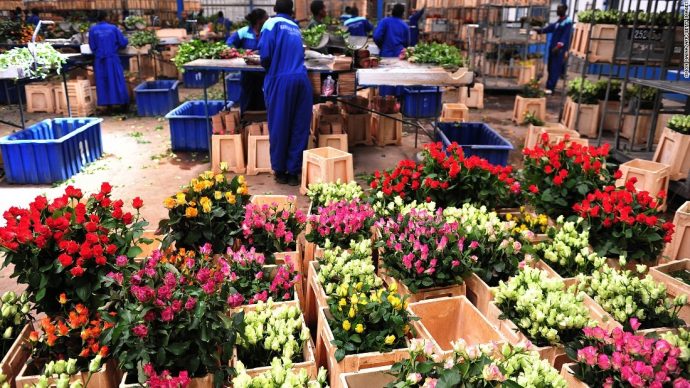If anyone was still doubting, yes, Africans too love flowers and can grow them. The floriculture in Kenya is a glaring prove of that. Adding to the growing dynamism of the African economy is the highly competitive flower industry in Kenya, which is one of the top suppliers of flowers worldwide, especially to the European market. Kenya is the main supplier to the Dutch flower auction, accounting for 44.6% of total supplies in 2011. On a global level after overtaking it competitors Israel and Ecuador through an average growth rate of 24% within a period of 10 years, it was rated the 4th largest flower exporter by value and volume closing behind the Netherlands and Columbia in the same year. Kenya’s flowers are currently sold in more than 60 countries worldwide, however most of the flowers are sold in European countries, Japan and Australia. The main flowers grown in Kenya are roses, carnations, alstromeria, gypsophilla, lilies, eryngiums, arabicum, hypericum, statice, and a range of other summer flowers.
The Kenyan flower industry is viewed as the oldest and largest in Africa generating approximately 1.29% of the country’s GDP. As early as 1988 the industry reportedly exported 10,946 tons compared to 86,480 tons in 2006. By 2010, 120.220 tons of flowers were exported as opposed to 136,601 tons in 2014. In 2016 the numbers slightly decreased to 133,658 tons, but rose considerable to 159, 961 tons in 2017, bringing in USD 823 million according to Horticultural Crop Directorate (HCD). The flower industry is one of the largest employers in the country, providing employment to over 100,000 people directly and an estimated 2 million people indirectly, mostly women.
Discover the leather industry in Africa
Kenya has an ideal weather and natural conditions for flower cultivation, which serve as a motivation for huge investments in the industry so far, leading to its speedy and remarkable success. Speaking of success, in 2018 a direct flight from Nairobi to New York opened the door into the US market. The US market is currently dominated by South American exporters. However, Kenya made it clear it is not going into the new market to overpower its competitors, but with the desire to bring in a new flare in the market. “What we’re looking at is an opportunity to diversify our markets to the American market and we’re also looking not to compete with the South Americans, who are the main producers or the main suppliers of flowers to North America, but to look at complementing the product. Because our products are very different,” said Jane Ngige, the former chief of the Kenya Flower Council while speaking to the VOA. Compared to the South American roses, Kenyan roses have smaller heads.
Success comes at a cost
Despite of its undeniable growth potential, the flower industry faces a huge amount of criticism ranging from social to environmental complaints. Most of the flower farms (127 flower farms nationwide) are situated around Lake Naivasha, about 90 kilometres northwest of Nairobi. “Naivasha is a big center because it’s a freshwater lake and it is not very far from Nairobi, which makes transport easy,” says John Kihia, technical director of Floralife Africa, a company which provides hydration, transport and storage for the cut-flower industry. The industry has been blamed for excessive use of water from the lake which poses a huge threat to the fishes. In 2009 a documentary film known as “A Blooming Business” accused flower farms of being solely responsible for polluting Lake Naivasha and its reduction in water levels. However, further reports claimed that the death of fish in Lake Naivasha early 2010 was not caused by chemical substances from the flower farms. The exact cause of the death of fishes remains uncertain. Other environmental concerns include Carbon emissions produced by long-distance transport and destruction of wetlands likewise original natural habitats. As the claims continue environmental NGOs, self-regulating organisations, such as Lake Naivasha Riparian Organisation, the Kenya Flower Council (KFC) and government institutions such as the National Environmental Management Authority (NEMA) are being encouraged to increase pressure on the industry to look into problems related to water usage, waste disposals, leakage of harmful chemicals and pesticides into the ground and into water bodies.
How does crowdfunding in Africa work? Find out here
In addition, the flower industry has been accused of exploiting its workers, especially female workers. In 2007 a UK based NGO known as Working Women Worldwide revealed women working in the industry tend to get low paying position compared to their male counterparts, as well as face sexual harassment, as “[w]omen often work in very isolated conditions, in huge greenhouses where workers are spaced far apart and no one can hear or see what is happening.” AETI report suggests that workers are prohibited from joining the trade union. Those who forcibly join a trade union are most likely to be demoted to lesser positions in the industry. Besides these concerns, there are worries about the health of workers who are exposed to harmful chemicals used in greenhouses during pesticide spraying, picking and sorting due to the lack of appropriate protective work attires as well as inadequate training on how to use the equipment at their disposal. “Skin lesions and allergies, respiratory problems, … fainting, headaches, eye problems…chronic asthma…and repetitive strain injuries,” claims War on Want, a charity organisation based in London.
Roses are red. Roses mean love. Roses make money. Roses bring change. Roses can also be sold in Africa. In as much as there is a huge focus on expanding the market to Europe and beyond, there is a dire need to identify and exploit market opportunities within the continent which support the cultivation and/ or sale of flowers. Africans too love flowers, in a very African way though.





